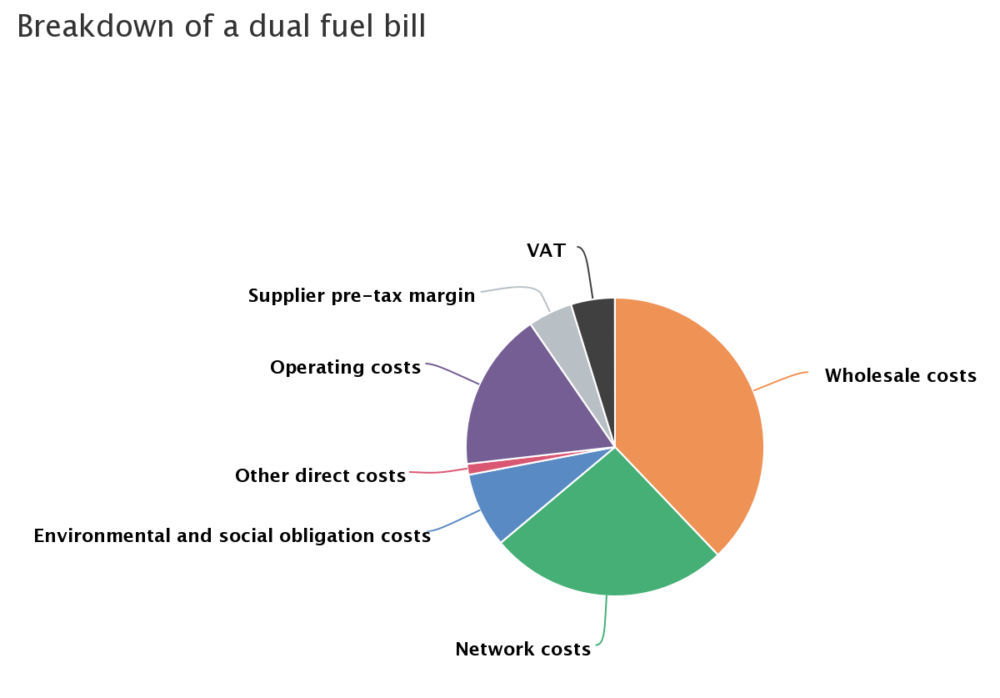Why are your energy prices increasing?

Your energy bills are going up. That is unless you are on a fixed rate tariff. But for those of you who aren’t, some 12 million people, then you could see your tariff increase by 8-15% in the coming months.
Most of the big energy suppliers have decided to introduce these increased tariffs, in order to cover costs. The demand for energy has never been higher, and with that means the cost of energy has never been greater either, which is now being reflected in energy costs for homeowners.
The energy market has experienced regular fluctuations recently, with providers competing for your business, all eager to offer you the best deal.

(Chart: Ofgem)
What is included in your energy bill?
There is a lot more than meets the eye with your energy bills. Included in the cost of your energy is not just the wholesale energy cost, but network costs, VAT, operating costs, governmental energy policy costs, and even supplier pre-tax margin.
Of the big six energy companies, in your average domestic duel fuel bill, 37.9% accounts for wholesale costs, 26% accounts for network costs, 8.1% accounts for environmental and social obligation costs, 17.2% accounts for operating costs. 4.8% is supplier pre-tax margins, 1.1% is other direct costs and 4.8% is VAT.
For gas only bills, the biggest difference is the reduced environmental and social obligation costs at 1.6% and the increased supplier pre-tax margin at 10.6%. For electricity only bills, the biggest difference is the now -1.1% supplier pre-tax margin and the increased environmental and social obligation costs at 14.8%.

Causes for rise in energy prices
The reason for energy prices being driven up can range from transportation of energy cost, availability of energy, rising wholesale costs, the cost of installing smart meters, governmental policy costs and also demand for energy. All of these causes are contributing factors for rising costs.
Although it may not look like much, the cost of governmental policies, like subsidies, will soon add up to £120-140 on an average household energy bill in 2018.
Installing smart meters into all 26 million homes in the UK is not cheap and expected to cost at least £11billion, a cost that will be recouped from homeowners energy bills. Ofgem currently deny that the cost of smart meters are a contributing reason for the supplier costs increasing, instead saying that fossil fuel costs rising being a top pressure.
The cost of transporting energy to where it’s needed is increasing for both gas and electricity. It is predicted to rise by 15% for electricity and just 6% for gas. The overall demand for gas has reduced in comparison to the demand for more electricity and alternative energy sources, which is reflected in the cost.
The cost of oil and gas has always fluctuated, however electricity prices have continuously been rising and between 2009 and 2014, that cost rose by a staggering 20%.

The cost of energy now and the energy forecast
As of September, British Gas increased the cost of electricity by 12.5% and it is expected that the average household bill will rise by 7.3% and is expected to affect over 3 million customers.. As electricity prices rise, the cost of gas will remain the same.
The future for electricity prices looks steep, with prices expected to increase yet again, because of the closure of more coal-fired power plants shutting and the need for more renewable energy sources increasing.
An energy price cap has been proposed by the government, and hopes to save around 70% of customers an average of £100 a year on their bills. Although the initiative is not yet in force and no time frame has been given on when it will be implemented.

What can you do?
The best way to reduce your energy bills is to become more energy efficient, whether that is keeping a close eye on your energy usage or investing in renewable energy for your home to run on. Also it might be worth looking into installing some renewable energy for your home, so you can avoid the hike in electricity costs, and solar panels also mean no more relying on buying electricity.
The simplest of things can help reduce your energy bills, like turning your thermostat down by one degree. You could try installing loft or cavity wall insulation to reduce the need for heating in winter or just turn your appliances off standby mode, as they can use a lot of energy this way.
You should look into getting a fixed rate tariff to avoid any unwanted surprises with your bills and tariff rate suddenly spiking. Some 12 million people were affected by sudden price increases this year because they weren’t on a fixed rate tariff – make sure you are ahead of the game.
On average homeowners save £200 by switching to a different energy provider and as of September 3.5 million people switched their provider in 2017 alone. It’s important that you find the best tariff for your home, don’t settle with the same provider at an increased price and always look around to find a better deal.
Read on to find out how you can beat the energy bills and the cold, with our top ways to keep your home warm this winter!
Back to blog



